The Turin Horse Blu-ray Movie
HomeThe Turin Horse Blu-ray Movie 
A Torinói lóCinema Guild | 2011 | 147 min | Not rated | Jul 17, 2012
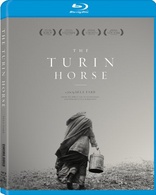
Movie rating
8 | / 10 |
Blu-ray rating
| Users | 0.0 | |
| Reviewer | 4.5 | |
| Overall | 4.5 |
Overview
The Turin Horse (2011)
A farmer and his daughter try to survive in a desolate landscape even though the horse that had always provided their livelihood has already given up on them.
Starring: János Derzsi, Erika Bók, Mihály KormosDirector: Béla Tarr, Ágnes Hranitzky
| Foreign | Uncertain |
| Drama | Uncertain |
| Period | Uncertain |
Specifications
Video
Video codec: MPEG-4 AVC
Video resolution: 1080p
Aspect ratio: 1.67:1
Original aspect ratio: 1.66:1
Audio
Hungarian: DTS-HD Master Audio 2.0
Subtitles
English
Discs
50GB Blu-ray Disc
Single disc (1 BD)
Playback
Region free
Review
Rating summary
| Movie | 4.5 | |
| Video | 5.0 | |
| Audio | 4.0 | |
| Extras | 3.0 | |
| Overall | 4.5 |
The Turin Horse Blu-ray Movie Review
Has the light gone out for you, because the light's gone out for me...
Reviewed by Casey Broadwater July 17, 2012This is the way the world ends: Not with a bang nor a whimper, not fire nor ice, but a howling storm followed by the sudden dimming of the light, as if a switch were flipped off on the sun. A fadeout to silence and everlasting darkness. At least, that's how it goes in The Turin Horse, the ninth and supposedly final film by Hungarian director Béla Tarr, the modern maestro of bleak, patience-testing metaphysical cinema, best known for his seven-hour magnum opus Sátántangó and the elegiac Werckmeister Harmonies. Earlier this year, when asked by the Los Angeles Times why this particular feature would be his last, Tarr replied, "I think I've said everything I could." The film does have the gravity of an ultimate pronouncement. Concerned with what the director himself describes as "the heaviness of existence," The Turin Horse is a nihilist screed that out-melancholies Lars Von Trier's thematically similar Melancholia, both of which are essentially atheistic takes on the apocalyptic malaise explored by the spiritually-minded Andrei Tarkovsky in his own career-capping work, 1985's The Sacrifice. If ideologically opposed, Tarr shares Tarkovsky's penchant for symbolically loaded, fable-like stories, along with his "sculpting in time" aesthetic of long, observational takes. This is a painfully slow film, but given its subject matter—the drudgery of day-to-day life and the inevitability of death—I can't imagine it any other way.
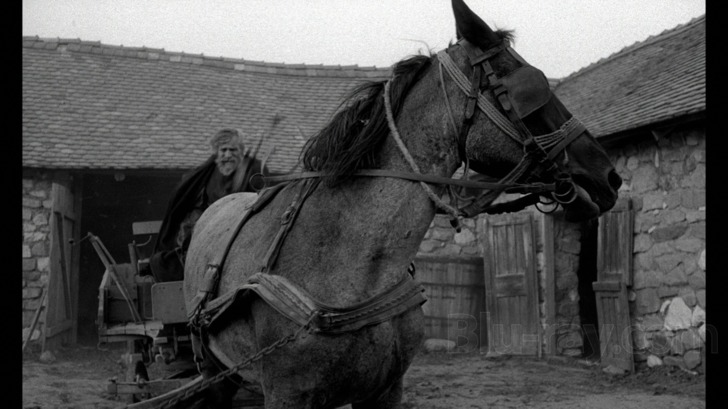
The film's title is a reference to the event that apocryphally triggered Friedrich Nietzsche's mental breakdown in 1889, a story described in the opening narration. Supposedly, while living in Turin, Nietzsche witnesses an angry cabman beating a stubborn horse; to put an end to the violence, the uncontrollably sobbing philosopher wraps his arms around the animal's neck in a gesture of protection and compassion. Shortly thereafter, he utters his last words, "Mutter, Ich bin dumm"—or, "Mother, I am dumb"—and lives for another ten years, "gentle and demented." Tarr and co-screenwriter László Krasznahorkai are fictionalizing here somewhat for the sake of effect; the Ich bin dumm quote is their own creation, foreshadowing the film's inevitable theme of silence in the face of death, as well as nodding to the fact that this will be Tarr's own final philosophical statement. "Of the horse," the narrator concludes, "we know nothing."
Nonetheless, the film imagines the horse's—and indeed the world's—final six days, a span of time told through precisely 30 shots, 146-minutes, and a series of narrative repetitions. The first day opens with Ohlsdorfer (Janos Derzsi), the crabby elderly cabman—with a paralyzed right arm and looking a bit like Simon of the Desert—driving the beast of burden home through a wind storm that will intensify unrelentingly as the film wears on. The man's nameless adult daughter (Erika Bok) greets him wordlessly at their simple stone cottage. She feeds hay to the horse, dresses her father for bed, and prepares two boiled potatoes for dinner. Ohlsdorfer scrapes the skin off of his with his good hand and frantically pushes the searing-hot chunks into his mouth. ("He could have waited until his potato cooled down a bit," a friend said to me later. "This is a Béla Tarr film; there's no need to rush.") We see this same routine, and others, play out several times—the dressing, the cooking, the harried eating, the fetching of well water, the act of sitting and staring blankly out the window at the raging storm outside. Tarr gives metaphorical weight to every aspect of this drudging existence; these are characters crushed by the pointless monotony of life.
There are some portentous interruptions, however, hinting that it all might be coming to an end. That night, the old man complains that he can no longer hear the woodworms that normally eat away at the roof; the next morning, the horse absolutely refuses to leave the yard. Later, a neighbor (Mihaly Kormos) stops by unbidden in search of brandy, and basically delivers the film's philosophical centerpiece, a Nietzsche-echoing monologue in which the man claims "whatever we touch, we debase," and that "there is neither God nor gods, there is neither good nor bad." When Ohlsdorfer asks him why he didn't just go into town for his drink, the neighbor casually replies, "The wind blew it away." This seems like a joke at first, but it becomes increasingly clear that the town and surrounding countryside are in the middle of a windy cataclysm not unlike the prophesied hurricane that destroys Macondo in Gabriel García Márquez' One Hundred Years of Solitude.
The Turin Horse might actually be thought of as a kind of magical realism in slow-motion; the realism is here in Tarr's deliberately paced attention to minute domestic detail, the magic in the allegorical apocalypse that slowly but inexorably descends. The horse stops eating. A roving band of gypsies harass Ohlsdorfer and his daughter, chanting, "We own the water, we own the earth! Drop dead, drop dead!" On the fourth day, the well goes dry and the two pack up their belongings and head over a distant hill, the sad horse in tow. In the film's most wonderfully absurd moment— comically depressing—the father and daughter disappear beyond the ridge and the camera sits and watches the empty landscape for a full minute before observing their return back over the hill and down to the cottage. They've presumably learned that what the neighbor said is true—there's nowhere left to go. They unpack and go about their usual business. When the end finally arrives, it comes like the human death that it obviously represents—quietly, weakly, a singular blinking out of the world, beyond which is only silence and nothingness.
Besides a description of events, platitudes about Tarr's visual genius, and some contextualizing of The Turin Horse as an appropriate conclusion to the director's remarkable body of work, there's really remarkably little to say about the film itself. This is Tarr's simplest—but arguably most resonating—story, entirely translucent in meaning and intent. We live. It's hard. We die. And that's fundamentally it. This brand of existential nihilism may not sit well with some, and make no mistake, The Turin Horse is utterly devoid of hope, love, or any of the more redeeming traits of humanity. Even subjective meaning in life—the last holdout of the optimistic existentialist—is blown away in the film's gale-force winds. You watch The Turin Horse for the thrill of staring into the abyss.
The Turin Horse Blu-ray Movie, Video Quality 
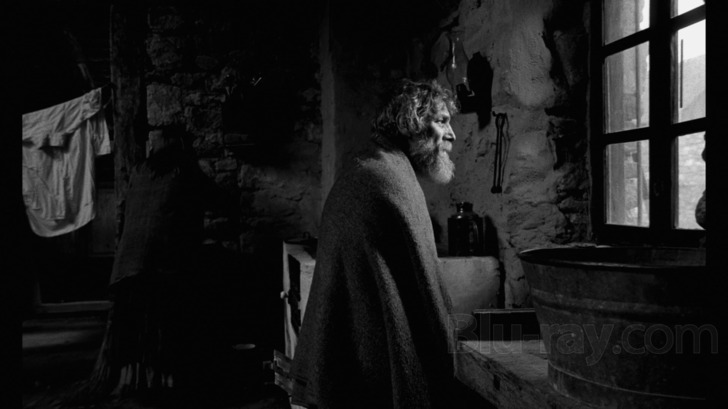
Without hyperbole, The Turin Horse features one of the best black and white Blu-ray presentations I've seen yet, right up there with The Seventh Seal and Letter Never Sent. Longtime Tarr collaborator Fred Kelemen's cinematography is starkly beautiful from start to finish— that should go without saying—and Cinema Guild's 1080p/AVC-encoded transfer never hinders it in any way. The natural 35mm grain structure is entirely intact, there are no overt compression issues, and it's obvious that there's been no tampering with the integrity of the print, e.g. no edge enhancement or digital noise reduction filtering. What we get here is pure image. Clarity is never less than striking, with extremely fine detail visible in the peasant clothing of the two leads, the hard-knock-life wrinkles and creases in their faces, the shaggy coat of the lugubrious horse, and the dingy interiors—and weathered exteriors—of the wind-wracked cottage. Just as importantly, the monochromatic gradation has a wonderful sense of contrast, with ink-deep blacks and crisp whites, the former rarely crushing and the latter rarely peaking. Of course, there's really no substitute for seeing a Béla Tarr film on the big big screen, but when it comes to home video, I don't think we could've asked for more from Cinema Guild's faithfully gorgeous transfer of The Turin Horse.
The Turin Horse Blu-ray Movie, Audio Quality 
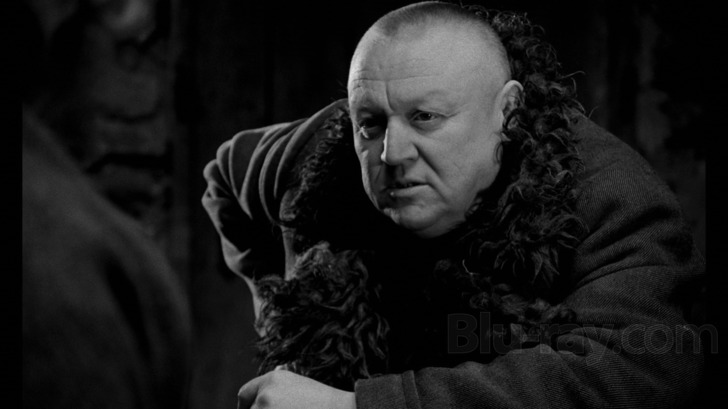
The core element of The Turin Horse's lossless DTS-HD Master Audio 2.0 stereo track is a nearly non-stop assault of high-speed wind, blowing unhindered over the scrubby countryside. While part of me wishes the film had a 5.1 surround sound mix, effectively putting us right in the middle of the storm, the other part readily acknowledges that an immersive multichannel presentation might've been too much—too oppressive, too pervasive, too hard to endure. The 2.0 mix is plenty intense on its own. Some of other effects do sound a little canned, oddly—I might be wrong, but the footsteps, the jingle of horse tackle, and the flapping of blown clothing all seem to have been recorded by foley artists on a sound stage—but whether or not this one-step-removed-from-reality artifice is fully intentional is hard to say. Regardless, it's not distracting and you get used to it quickly. Aside from the wind, the most memorable aspect of the mix is Mihály Víg's haunting score, which consists of a repetitive minor-key arpeggio overlaid with quivering strings. It sounds wonderful here, the timbres of its cellos and violins richly reproduced. The Hungarian narration and spartan dialogue is well handled too, clean, balanced, and always easy to understand. The disc includes optional English subtitles, which appear in white lettering.
The Turin Horse Blu-ray Movie, Special Features and Extras 

- Audio Commentary with Jonathan Rosenbaum: Film critic Jonathan Rosenbaum admits up front that there really isn't much too say about The Turin Horse; for all its length and gravity, it's a very straightforward film. Appropriately, then, he expands his focus to the entirety of Tarr's career, discussing the director's biography, his overarching themes and inspirations, and the apparent stylistic split between his earlier and later works. The track only lasts for seventy minutes, about half of the film's runtime.
- "Hotel Magnezit" (1080p, 12:18): A 1978 short film by Tarr in which an old man is asked to leave the boarding home he lives in, resulting in an argument between the other residents and the employees. Told mostly in tight closeups. Note that while this is technically presented in high definition, it's clearly been duped on video.
- Press Conference (SD, 49:46): The film's panel at the 2011 Berlin Film Festival, featuring Tarr, co-director Agnes Hranitzky, actors Mihaly Kormos, Erika Bok, and Janos Derzsi, director of photography Fred Kelemen, composer Mihaly Vig, and co-producer Gabor Teni. Presented in its entirety, and dubbed—not subtitled—in English. There are some interesting Q's and A's here, but the panel is quite tedious to watch because of all the pauses for translation.
- Regis Dialogue with Bela Tarr at the Walker Art Center (SD, 1:21:29): Conducted in 2007, film critic Howard Feinstein interviews Tarr about his filmography. Includes clips from films up to The Man from London.
- Theatrical Trailer (1080p, 2:29)
- Also from Cinema Guild: Trailers for several additional Cinema Guild Blu-ray and DVD releases.
- Booklet: Inside the Blu-ray case you'll find a two-page fold-out with an essay by film journalist J. Hoberman.
The Turin Horse Blu-ray Movie, Overall Score and Recommendation 
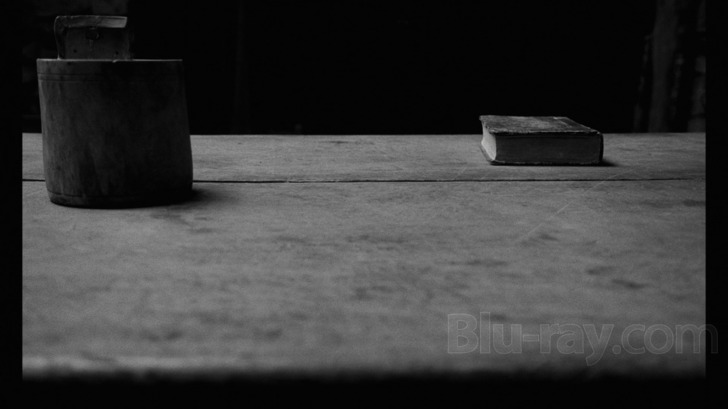
Bleak and glacially paced, Béla Tarr's films are most definitely not for everyone, and The Turin Horse is especially moribund, a heavy allegory on the pointlessness of life and the finality of death. It's unquestioningly one of the most beautiful films of the last few years, though, and those with the patience and philosophical mindset to endure/enjoy it will find it memorably austere. Cinema Guild's Blu-ray edition is simply stunning to behold, and the disc includes several worthwhile extras, including a commentary track by film critic Jonathan Rosenbaum and a nearly hour and a half-long interview with the director. Highly recommended for Nietzscheans, existential nihilists, and all fans of decidedly non-commercial cinema.
Similar titles
Similar titles you might also like

Satantango
Sátántangó
1994

Germany Year Zero
Germania anno zero
1948

The Sacrifice 4K
Offret
1986

Nostalghia 4K
1983

Red Desert
Il deserto rosso
1964

La Notte
1961

Toni Erdmann
2016

Heart of Glass
Herz aus Glas
1976

The Passion of Anna
En passion
1969

Alps
Alpeis
2011

Beyond the Hills
După dealuri
2012

Beanpole
Дылда / Dylda
2019

Wrong Move
Falsche Bewegung
1975

Two Days, One Night
Deux jours, une nuit
2014

Stray Dogs
郊游 / Jiao you
2013

Phoenix
2014

The Marriage of Maria Braun
Die Ehe der Maria Braun
1978

The Club
El Club
2015

Rome, Open City
Roma cittŕ aperta
1945

Persona
1966